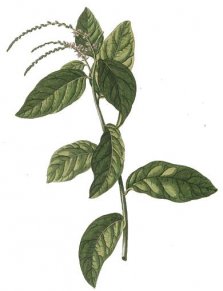
Bush tea’ is something many Jamaicans grew up on, where the ‘bush’ in question could be anything from black mint to lime leaf to cerasee to guinea hen weed and many more. Our grandparents would tell us that these plants were good for us, especially if the plants weren’t pleasant to the taste. And they were right. Many in the older generations knew which plants worked for which ailments through observation, or accounts handed down from their own parents, and today, scientific findings have backed up the effectiveness of these ‘home remedies.’ The particular ‘bush’ under the microscope today is guinea hen weed.
The plant is known by several other names in Jamaica – guinea hen leaf, garlic weed or gully root. It is also known as anamu in South America. Research has found that it can treat a number of ailments, and even contains cancer-fighting properties. Today, we read in The Gleaner that local researchers, led by Dr Henry Lowe, have discovered antiviral properties in the plant. Many of us hit by the chikungunya virus in 2014 certainly turned to the plant for relief. Guinea hen weed contains a compound known as dibenzyl trisulphide (DTS), which has been proven to inhibit the survival of the human hepatitis C virus and the human immunodeficiency virus (HIV).
Here are some more interesting facts about guinea hen weed:
- Guinea hen weed is indigenous to the Amazon rainforest and the tropical areas of the Caribbean, Central and South America, and Africa.
- Herbalists and natural health practitioners have traditionally used it for a wide variety of conditions including arthritis, digestive disorders, infections, diabetes, cancer, pain relief and even to induce abortions – it causes contractions of the uterus that can lead to abortions and miscarriages.
- Modern scientific research has discovered many biologically active compounds in the plant, including flavanoids, triterpenes, steroids, and sulfur compounds. Of the 20 compounds isolated from the plant – several of which had never been identified in nature before, some were similar to those found in garlic, another plant known to have numerous medicinal properties.
- Compounds such as DTS and astilbin are actually capable of differentiating between healthy cells and cancerous ones, killing only the latter, unlike other forms of treatment such as chemotherapy.
- It contains a low concentration of a blood thinner called coumadin. People with bleeding disorders such as haemophilia or who are on blood thinning medication should consult their health-care provider before consuming the plant in any way.
Source:Dig Jamaica-http://digjamaica.com/m/blog/5-interesting-facts-about-guinea-hen-weed/#:~:text=Herbalists%20and%20natural%20health%20practitioners,lead%20to%20abortions%20and%20miscarriages.
